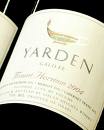Retailers may still lump all kosher wines together on the shelves, but consumers will be pleased to find within this category a broad array of fine wines from around the world. In addition to Israel, which recently has been turning out fine wines, most wine-producing countries produce kosher wines.
Martin Davidson, from Royal Wine Corporation, the country’s leading importer of kosher wines, told me that they have a selection of over 150 wines from Australia, California, Chile, France, Italy and New Zealand — in addition to Israel.
Baron Edmond Rothschild created a kosher vineyard in the Médoc region of Bordeaux two decades ago to honor his grandfather, who helped resurrect winegrowing in Israel at the end of the 19th century.
 Now, several prestigious Bordeaux chateau, including Château Giscours, Château Léoville Poyferré and Château Pontet Canet, have joined him with kosher bottlings. Champagne producers Laurent Perrier and Nicolas Feuillatte both make outstanding kosher Champagnes, indistinguishable in taste from their standard (non-kosher) offerings. Upscale kosher offerings from California are now widely available.
Now, several prestigious Bordeaux chateau, including Château Giscours, Château Léoville Poyferré and Château Pontet Canet, have joined him with kosher bottlings. Champagne producers Laurent Perrier and Nicolas Feuillatte both make outstanding kosher Champagnes, indistinguishable in taste from their standard (non-kosher) offerings. Upscale kosher offerings from California are now widely available.
For a wine to be kosher, the winemakers and everyone who touches the wine must be Orthodox Jews. Non-Orthodox Jews and non-Jews can direct the winemaking, but cannot actually touch the grapes or anything involved in the winemaking process.
The winemaker at Galil Mountain Winery, already a top-notch producer in northern Israel after only a few years, is Jewish, but not an Orthodox Jew. Hence he must direct the winemaking via Orthodox assistants. (Talk about hands-off winemaking!)
All of the products used during winemaking must be kosher.
Many of the other rules for making kosher wines are principles premium winemakers around the world embrace. For example, the winery must be cleaned thoroughly, which also minimizes the chance of off flavors from bacterial contamination.
Two common misconceptions about kosher wines need to be corrected. First, kosher wines need not be sweet. A plethora of dry wines made from Cabernet Sauvignon, Merlot and Chardonnay exist. Secondly, kosher wines need not be boiled. Sometimes the juice, or even the wine, is flash-pasteurized, but even some prestigious French producers of non-kosher wines, such as Louis Latour or Château Beaucastel, employ this technique to stabilize the wine.
For specific recommendations for kosher wines, consult WRO’s wine reviews. This week’s reviews include kosher wines from Israel, Barons de Rothschild and Herzog. Also check out reviews of Israeli wines in WRO’s archives by using the wine search tool (here). Click on Israel on the search tool’s drop-down menu.
2
